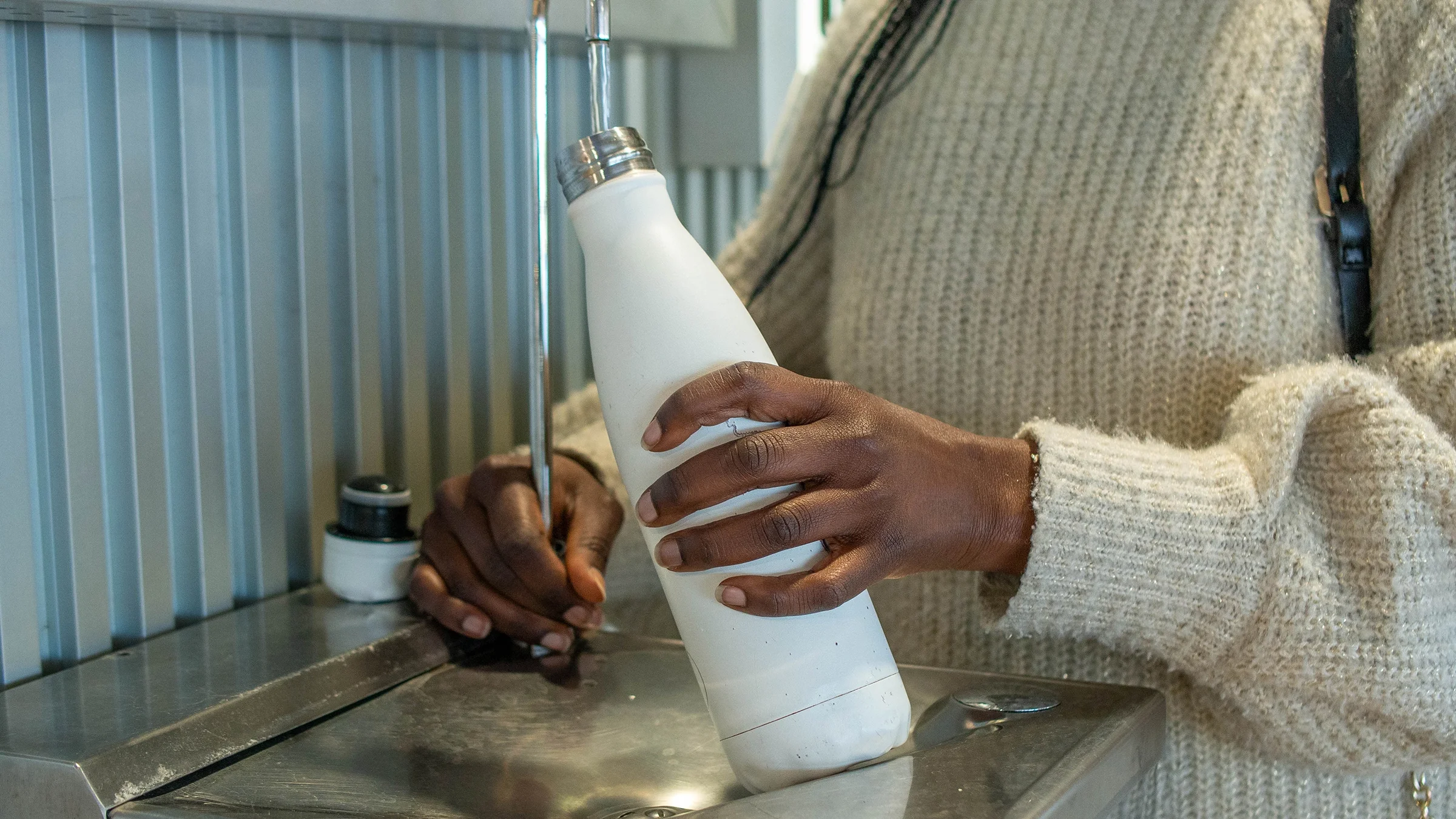Key takeaways:
Traveling can make symptoms of irritable bowel syndrome (IBS) worse for many different reasons. Travel disrupts your body’s normal routine and diet, and is naturally stressful.
Try to maintain your regular lifestyle as much as possible, especially your diet and sleep habits. It also helps to practice techniques that can help lower stress.
Be prepared if a flare does happen. This includes keeping your trusted medications on hand and planning for easy access to a bathroom.
Traveling is stressful enough. Add irritable bowel syndrome (IBS) to the mix, and it can feel like navigating a minefield. “Even the anticipation of having digestive symptoms during travel can make things worse,” said gastroenterologist Wendi LeBrett, MD.
People with diarrhea-dominant IBS (IBS-D) will often get worse diarrhea, and those with constipation-dominant (IBS-C) will have worse constipation, LeBrett said. But planning ahead can help you avoid an IBS flare-up. Here are a few tips to try before your next adventure.
Does travel itself make IBS worse?
Travel can trigger digestive issues in anyone. But people with IBS often have it worse.
“Our digestive systems are creatures of habit,” LeBrett said. “Even slight changes from our usual patterns can lead to changes in digestion that cause constipation or diarrhea.”
Travel disrupts so many parts of your routine. You might experience changes in diet, sleep, activity levels, and hydration.
For people with IBS, these changes can be particularly problematic. Many people with IBS also have symptoms that are sensitive to any increase in stress. And simply not having access to your own toilet can cause stress, according to LeBrett.
Tips for traveling with IBS
If your IBS tends to flare during travel — or keeps you from traveling in the first place — the following tips can help.
1. Bring a reusable water bottle
It’s easy to forget to stay hydrated when you’re traveling. But research shows being even a little bit dehydrated can make constipation worse. That’s especially relevant for people with IBS-C.
The best way to make sure you have enough fluids is to bring a reusable water bottle wherever you go. Fill it up once you get through TSA so you have a full bottle on the plane.
Is it IBS? If you often experience digestive woes, take this quiz to find out if it could be due to irritable bowel syndrome (IBS).
You are not alone. One woman with IBS shares her personal tips for how she was able to reclaim her love of travel.
What are the worst foods for IBS? These specific foods are the common triggers for IBS flares.
If you’re traveling to locations with an increased risk of contaminated water, don’t drink the tap water. Tap water can be contaminated with bacteria that can make you sick and worsen IBS symptoms. It’s best to stick to bottled water when traveling abroad.
2. Avoid trigger foods
When traveling, it can be hard to plan your meals ahead of time. And it’s fun to try new foods when you are in a new location. But as tempting as street food and local cuisine may be, it might not be worth it if it’s going to make your IBS worse. Sticking to your usual IBS diet keeps one constant throughout your travels and can help you avoid a flare-up.
And keep in mind that certain foods can make IBS symptoms worse. For many people, these trigger foods include:
FODMAPs: These foods contain carbohydrates that aren’t digested well in the small intestine. So they can cause bloating, gas, diarrhea, and constipation. They include certain types of fruits, vegetables, grains, nuts, and legumes.
Caffeine: Caffeine increases how fast food moves through the intestines. And this can cause diarrhea and cramping in people with IBS
High-fat foods: Fatty foods take longer to digest. For some people, this can lead to stomach pain, gas, and bloating.
3. Find ways to lower your stress
Traveling can be a major source of stress. And research shows that stress triggers IBS flare-ups. In fact, some researchers call IBS a combination of an irritable bowel and irritable brain.
That’s why learning ways to find your calm is so important. Before you travel, try out a few different techniques to see what works best for you. These can include:
Taking a few minutes to write down your thoughts in a journal
Doing breathing exercises
Listening to a guided meditation
Listening to calming music
Practicing progressive muscle relaxation
4. Prioritize good sleep
One of the best ways to lower stress is to get a good night’s sleep. And research shows that getting a poor night’s rest can worsen IBS symptoms the next day. So make sure to prioritize sleep the best you can while you travel.
There are plenty of things you can do to help you get good sleep. These include:
Setting aside your electronics before bed
Avoiding caffeine at least 6 hours before bed
Wearing an eye mask to block out light
Avoiding long naps during the day
Taking a warm bath or shower before bed
5. Take a walk after dinner
Travel often provides many opportunities for walking. And this may be particularly helpful after meals. “Taking time to exercise or go on a walk — especially after eating — can help relieve bloating and gas,” LeBrett said. Gentle movement helps digestion by moving food through your gastrointestinal (GI) tract.
Walking also helps clear your mind and decompress from the day, which is a great way to relieve stress. And it can double as a chance to see new sights when you’re traveling in a new area.
6. Bring herbal tea with you
Some herbal teas can help with IBS symptoms by relaxing the muscles in the digestive tract. Peppermint tea and ginger tea seem to work best on gas, cramping, and bloating.
If you’re flying, pack a handful of tea bags with you in your carry-on luggage. Most airlines provide hot water so you can make your own tea on the plane. If you’re driving, take a thermos of hot brewed tea with you. Or you can use the hot water to brew tea on the road.
7. Pack your meds
Remember to bring along trusted remedies while traveling. Depending on the type of IBS you have, consider bringing over-the-counter (OTC) medications, such as:
Simethicone (Gas-X)
Bismuth subsalicylate (Pepto Bismol)
Loperamide hydrochloride (Imodium)
Laxatives
Imodium (antidiarrheal) can be helpful for people with IBS-D. It can also help on travel days where bathrooms are hard to find. But LeBrett recommends talking with your healthcare team before using Imodium. It’s not the best choice for all types of diarrhea.
People with IBS-C might want to bring an OTC laxative with them. LeBrett recommends Miralax or psyllium fiber. Dried prunes or kiwi are also good natural laxatives to help maintain bowel regularity if you have constipation.
If you want to have some meds on hand but you’re not sure which ones are best for you, ask your healthcare team for suggestions. They may also be able to give you a prescription antispasmodic for IBS symptoms.
8. Avoid drinking too much alcohol
Many people like to celebrate travel and time off with an airport beer or champagne on the plane. But try to be mindful of how much you’re drinking. Drinking a lot of alcohol in a short time can worsen diarrhea for people with IBS. But moderate drinking usually doesn’t have a big effect on symptoms.
So what’s considered moderate drinking? The CDC recommends women limit themselves to 1 drink per day, and men should max out at 2.
9. Know where the bathrooms are
Bathroom planning can be a lifesaver when you have IBS. Many people with IBS are used to mapping out the nearest bathrooms. Knowing where they are can help relieve stress associated with finding one.
If you’re flying, book an aisle seat so you have easy bathroom access. And always use the bathroom before boarding. If you’re road-tripping, be sure to build in time for rest stops.
What should you do if you have an IBS flare while traveling?
If you have a big trip coming up, talk with your healthcare team about the best remedies to bring along with you. They can suggest medications or OTC remedies that will best help your IBS symptoms during a flare. As mentioned above, taking an antidiarrheal like Imodium may help a sudden IBS-D flare. And taking a laxative may help relieve constipation if you have IBS-C.
If you’re traveling abroad, note that OTC meds may go under different names in another country. This makes it even more important to bring along whatever meds you might need. In addition, bring a written list of the medications you may need. Be sure to write down the generic name and active ingredient in each medication. This way, you know what to ask for if you need to visit drugstores abroad.
The bottom line
Planning ahead can help alleviate travel-related stress when you have IBS. Research dining options and bring IBS-friendly snacks. And pack your trusted remedies for symptom relief.
Most importantly, the goal is to maintain as much of your normal routine as possible. That means keeping your sleep habits as well as diet and regular meal times. This will help reduce the stress on your digestive system.

Why trust our experts?


References
Alammar, N., et al. (2019). The impact of peppermint oil on the irritable bowel syndrome: A meta-analysis of the pooled clinical data. BMC Complementary and Alternative Medicine.
Bodagh, M. N., et al. (2018). Ginger in gastrointestinal disorders: A systematic review of clinical trials. Food Science and Nutrition.
Buchanan, D. T., et al. (2014). Sleep measures predict next-day symptoms in women with irritable bowel syndrome. Journal of Clinical Sleep Medicine.
Centers for Disease Control and Prevention. (2024). Alcohol use and your health.
Hübner, W. D., et al. (2002). Charcoal tablets in the treatment of patients with irritable bowel syndrome. Advances in Therapy.
National Center for Emerging and Zoonotic Infectious Diseases. (2022). Avoid contaminated water during travel. Centers for Disease Control and Prevention.
Okawa, Y. (2022). A discussion of whether various lifestyle changes can alleviate the symptoms of irritable bowel syndrome. Healthcare.
Qin, H., et al. (2014). Impact of psychological stress on irritable bowel syndrome. World Journal of Gastroenterology.
Toussaint, L., et al. (2021). Effectiveness of progressive muscle relaxation, deep breathing, and guided imagery in promoting psychological and physiological states of relaxation. Evidence-based Complementary and Alternative Medicine.














